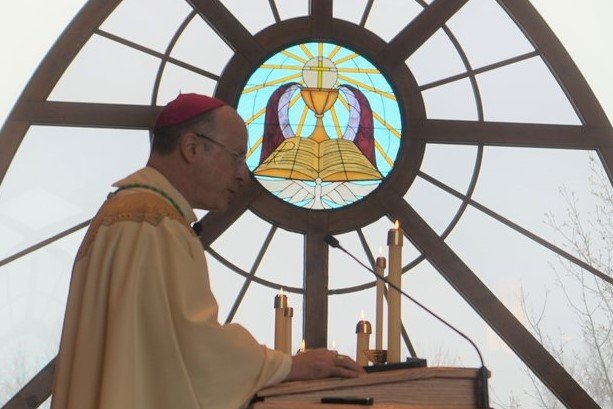Bishop: Life in the Risen Christ must lead the faithful to mercy, gratitude
“We were indeed buried with Him through Baptism into death, so that just as Christ was raised from the dead by the glory of the Father, we, too, might have newness of life.”
This statement from St. Paul’s Letter to the Romans points to new life after physical death, as well as to resurrected life shared here and now in Christ and the Holy Spirit.
“We are baptized in order to live in the Light of Mercy in a world that can be very dark, full of death, violence, greed and hatred, and so unmerciful,” said Bishop W. Shawn McKnight in his homily for the Easter Vigil.
“Our lives are different because of the mercy we have received,” the bishop said. “And living the resurrected life means living in Christ’s peace with God and one another.
“All of our past sins against God and one another have been nailed to the Cross, so now is the time for us to practice the mercy we have received,” he said.
The bishop celebrated the Easter Vigil at dusk on Holy Saturday, concurrently with priests in parishes throughout the diocese.
Symbols of fire, light, water, oil, bread and wine were highlighted in a Liturgy filled with some of the Church’s oldest and richest traditions and rituals.
The bishop baptized members of the elect and confirmed and gave First Holy Communion to the candidates for full communion at Cathedral of St. Joseph Parish, as did priests in parishes throughout the diocese.
He did so in temporary quarters in the St. Joseph Cathedral School gymnasium, while the Cathedral of St. Joseph is closed for renovation.
The bishop noted that Easter, which lasts for 50 days, is the apex of the entire liturgical year.
“All that has come before,” he said, “beginning with Advent and Christmas, and all that flows afterward, with the Easter Season, the celebration of Pentecost, and the rest of Ordinary Time — the entire liturgical year centers on the resurrection of Jesus Christ from the dead!”
Humbly obedient
The Easter Vigil was the culmination of the Church’s communal observance of Holy Week and the 40-day period of penitential preparation.
“Christ died and rose again in glory so we could know the fullness of His love, now and forever,” Bishop McKnight preached on Palm Sunday, one week before Easter.
He noted that God’s incomprehensible love entered the world as “a tiny, vulnerable infant and grew into a man Who fearlessly, humbly and selflessly accepted God’s plan for Him.”
Jesus, fully aware that He would soon be betrayed and would suffer an unspeakable death, entered Jerusalem openly to shouts of acclimation.
“Jesus’s courage and resolve are more than heroic,” Bishop McKnight noted, “for He knows Who He is and what His mission is.
“He sacrifices Himself in this ultimate act of love, to show us that nothing is greater than the love of our Father,” the bishop continued. “In His suffering and sacrifice, Jesus shows us that the ultimate act of love is forgiveness.”
The only proper response to that forgiveness is to follow Jesus’s path of sacrifice while spreading the Good News of His love and mercy.
“It definitely means being humbly obedient to God, trusting that He will sustain us in the sacrifices we make and the actions we take to share His love with others,” the bishop said.
In perfect gratitude
During Mass on Holy Thursday, Bishop McKnight spoke of gratitude as it pertains to the Last Supper, specifically the institution of the Holy Eucharist and of the Ministerial Priesthood, and Jesus’s command to His apostles to love another.
“Of all the people at the Last Supper, Jesus was the only One Who was entitled to anything,” Bishop McKnight noted. “And He did not cling to what He was owed, but instead humbly served others.”
Modeling perfect gratitude to the Father, Jesus instructed His apostles to “Do this in memory of Me.”
By instituting the Eucharist, He brought forth a whole new way of living.
“When Jesus said to the men at the table of the Last Supper, ‘Do this in memory of Me,’ He was literally talking about ‘doing the Eucharist’ about serving as His priests, in the key of charity,” Bishop McKnight noted.
He emphasized that Priesthood and every vocation must be rooted in a desire to serve, not to be served.
“A true disciple looks not how much better they are in comparison to others, but how they might be of help to them in their needs,” the bishop asserted. “Being a joyful giver of one’s time, talent and treasure is the way to live out the Eucharist we will celebrate on this altar on this night.”
“And our regular participation as Mass, especially when we receive Holy Communion, serves to inoculate us against sins of ingratitude,” he said.






